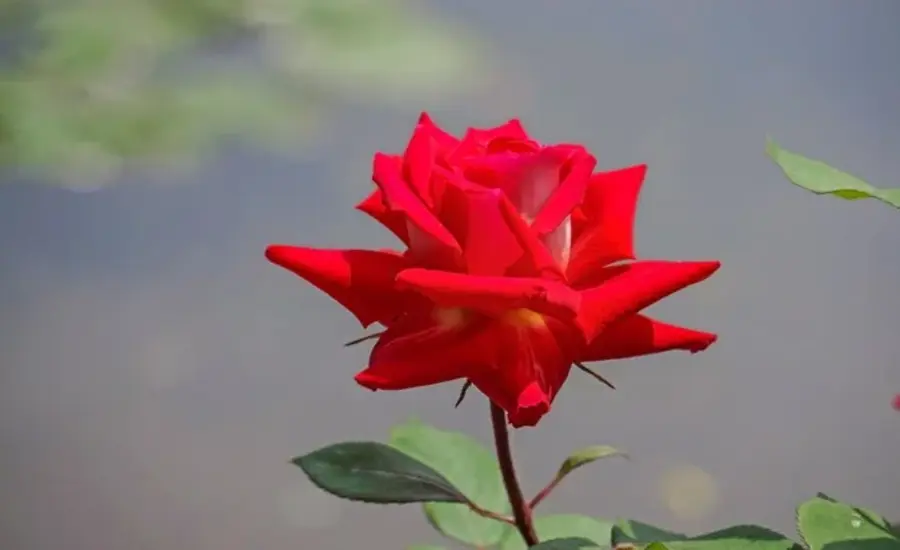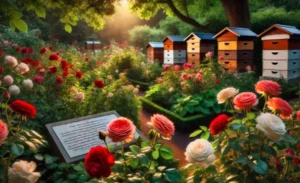Lifestyle
Discover the Magic of The King’s Roses NWBKA

Nestled in the heart of serene landscapes lies a vibrant and thriving community known as The King’s Roses NWBKA. More than just a name, this unique initiative represents a blend of history, passion, and commitment to nature’s delicate harmony. The King’s Roses NWBKA has become a symbol of excellence in beekeeping and a beacon of environmental sustainability. Through their dedication, they weave a narrative that intertwines the beauty of roses, the fascinating world of bees, and the shared human endeavor to protect and cherish our ecosystem. This article explores the remarkable story of The King’s Roses NWBKA, its vision, and the profound impact it has had on communities and the environment.
The Roots of The King’s Roses NWBKA
To fully appreciate the essence of The King’s Roses NWBKA, one must delve into its origins. Established with the mission to preserve the rich legacy of traditional beekeeping while embracing modern ecological practices, NWBKA (Northwest Beekeeping Association) set out on a journey of transformation. The incorporation of “The King’s Roses” into its name is not merely symbolic—it represents the organization’s commitment to cultivating beauty and fostering sustainability. The roses, emblematic of nature’s elegance, serve as a powerful metaphor for resilience, growth, and interconnectedness.
The association’s founders were visionaries who recognized the declining bee populations as a critical environmental challenge. Understanding that bees play a pivotal role in pollination and the health of ecosystems, they sought to create a sanctuary where these industrious insects could thrive. In doing so, they also envisioned a platform for education, community engagement, and collective action. The King’s Roses NWBKA emerged as a pioneering force, inspiring countless individuals to reconnect with nature and contribute to ecological preservation.

A Symphony of Roses and Bees
At the heart of The King’s Roses NWBKA lies a captivating partnership between roses and bees—a relationship that epitomizes the beauty of natural symbiosis. Roses, renowned for their enchanting fragrance and visual splendor, rely on pollinators like bees for reproduction. In turn, bees depend on floral nectar and pollen for sustenance. The careful cultivation of rose gardens within NWBKA’s apiaries serves a dual purpose: it enhances biodiversity while providing a nurturing habitat for bees.
The King’s Roses are not ordinary flowers; they are a carefully curated selection of species known for their high nectar yield and ecological benefits. These roses are meticulously cared for using organic practices, ensuring a pesticide-free environment that prioritizes the health of pollinators. Visitors to The King’s Roses NWBKA often describe the gardens as a sensory paradise—a tapestry of colors, scents, and sounds that evoke a profound sense of wonder and connection to nature.
Beekeeping: The Lifeblood of NWBKA
Central to the mission of The King’s Roses NWBKA is its beekeeping program, which exemplifies the art and science of sustainable apiculture. Beekeeping, a practice as ancient as civilization itself, has evolved over the centuries, blending traditional knowledge with modern innovation. At NWBKA, beekeeping is more than a vocation; it is a labor of love and a testament to the enduring relationship between humans and bees.
The association’s apiaries are a testament to thoughtful design and meticulous care. Each hive is strategically placed to optimize access to floral resources while minimizing environmental stressors. NWBKA’s beekeepers employ natural beekeeping techniques, such as using hive designs that mimic bees’ natural habitats and avoiding synthetic chemicals. These practices not only ensure the health and vitality of the bee colonies but also produce honey of unparalleled quality.
The honey produced at The King’s Roses NWBKA is celebrated for its unique flavor profiles, a reflection of the diverse floral sources within the apiaries. From delicate notes of wildflower to the rich essence of rose nectar, each jar of honey is a testament to the artistry of beekeeping and the magic of nature. The honey is not merely a product; it is a narrative—a tangible representation of the harmony between humans and the natural world.
Education and Community Engagement
The King’s Roses NWBKA goes beyond its role as a beekeeping association; it is a hub for education and community building. Recognizing that awareness and knowledge are the cornerstones of conservation, the organization offers a wide range of workshops, seminars, and hands-on experiences designed to engage people of all ages. These initiatives aim to demystify the world of bees, instill a sense of responsibility for the environment, and inspire action.
One of the most popular programs is the “Beekeeper for a Day” experience, which allows participants to don a beekeeper’s suit and step into the world of apiculture. Under the guidance of expert beekeepers, visitors learn about hive management, bee behavior, and the intricacies of honey production. This immersive experience not only provides practical knowledge but also fosters a deeper appreciation for the challenges and rewards of beekeeping.
The King’s Roses NWBKA also places a strong emphasis on engaging young minds. Through school outreach programs, children are introduced to the fascinating world of bees and the critical role they play in the environment. Interactive activities, such as building bee hotels and planting pollinator-friendly gardens, empower children to take small but meaningful steps toward conservation.
Environmental Stewardship and Sustainability
The King’s Roses NWBKA stands as a model of environmental stewardship, demonstrating that sustainable practices can lead to profound positive impacts. The association’s commitment to organic methods and biodiversity conservation extends beyond its own operations. By partnering with local farmers, gardeners, and environmental organizations, NWBKA has created a ripple effect, encouraging others to adopt eco-friendly practices.
One notable initiative is the Pollinator Corridor Project, which aims to establish a network of pollinator-friendly habitats across the region. By connecting gardens, farms, and natural areas, this project provides critical resources for bees and other pollinators, helping to mitigate the effects of habitat loss and fragmentation. The success of this project has inspired similar efforts in neighboring communities, highlighting the power of collaboration in achieving ecological goals.
The Magic in Numbers: Community Impact
- Volunteer Involvement: The King’s Roses NWBKA thrives on the dedication of its volunteers, who contribute countless hours to the upkeep of the apiaries, gardens, and educational programs. Their passion and commitment are the lifeblood of the organization.
- Local Economy Boost: Through the sale of honey, beeswax products, and other artisanal goods, NWBKA supports the local economy and provides a platform for small businesses and craftsmen to showcase their talents.
- Biodiversity Growth: The establishment of pollinator habitats and the promotion of organic gardening practices have led to a measurable increase in local biodiversity, benefiting not only bees but also birds, butterflies, and other wildlife.
A Call to Action
As The King’s Roses NWBKA continues to flourish, it invites individuals from all walks of life to join its journey. Whether through volunteering, participating in educational programs, or simply adopting pollinator-friendly practices in their own lives, everyone has a role to play in safeguarding the environment. The magic of The King’s Roses lies not only in its roses and bees but also in the collective spirit of a community united by a shared vision of sustainability and harmony.
Conclusion
The King’s Roses NWBKA is more than an organization; it is a testament to what can be achieved when passion, purpose, and community come together. By nurturing the delicate relationship between roses and bees, embracing the art of beekeeping, and fostering environmental awareness, NWBKA has created a legacy that will inspire generations to come. Discovering the magic of The King’s Roses NWBKA is not just a journey into a world of beauty and wonder—it is an invitation to be part of a movement that celebrates and protects the marvels of our natural world.
FAQs:
1. What does NWBKA stand for?
NWBKA stands for Northwest Beekeeping Association, a dedicated organization committed to sustainable beekeeping, environmental preservation, and community education. The addition of “The King’s Roses” signifies its unique integration of rose gardens and apiaries.
2. What is the main mission of The King’s Roses NWBKA?
The primary mission of The King’s Roses NWBKA is to promote sustainable beekeeping, preserve declining bee populations, and enhance biodiversity by creating pollinator-friendly habitats. The organization also focuses on educating the public about the importance of bees and their role in maintaining ecological balance.
3. Why are roses significant to the NWBKA?
Roses are integral to the identity of The King’s Roses NWBKA as they symbolize natural beauty, resilience, and growth. The rose gardens within the apiaries are carefully designed to provide nectar and pollen for bees, creating a harmonious environment that benefits both the plants and pollinators.
4. Can anyone visit The King’s Roses NWBKA?
Yes, The King’s Roses NWBKA welcomes visitors through various programs, guided tours, and workshops. Whether you are a nature enthusiast, a budding beekeeper, or simply curious, there are opportunities to experience the magic of their apiaries and rose gardens.
5. Is the honey produced at NWBKA organic?
Yes, the honey produced by The King’s Roses NWBKA is organic. Their beekeeping practices prioritize natural methods, avoid synthetic chemicals, and maintain a pesticide-free environment, ensuring high-quality, pure honey.
6. Are there opportunities for children to learn about bees?
Absolutely! NWBKA has special programs for children, including school outreach activities, interactive workshops, and family-friendly events. These programs aim to spark curiosity about bees and teach the importance of pollinators in a fun and engaging way.
-

 Fashion8 months ago
Fashion8 months agoLiteroticaTags Explained: Find And Use The Top Tags For 2025
-

 BUSINESS9 months ago
BUSINESS9 months agoWhat is NippyDrive? A Complete Guide to Using NippyDrive
-

 Biography9 months ago
Biography9 months agoCoco Lovelock Bio, Age, Career, Net Worth, Height, Education, Boyfriend & More
-

 Biography9 months ago
Biography9 months agoWho Is Meow Miu? Get to Know the Latest Star in the Spotlight
-

 Fashion8 months ago
Fashion8 months agoWebfreen.com Fashion: Redefining Affordable Luxury
-

 Home Improvement8 months ago
Home Improvement8 months agoValvula Check 32mm Sodimac: Comprehensive Guide
-

 TECHNOLOGY7 months ago
TECHNOLOGY7 months agoTransform Text into Stunning Videos: Free Online AI Text-to-Video Generator
-

 BUSINESS6 months ago
BUSINESS6 months ago9 Packaging Trends You Can’t Afford to Ignore in 2025
